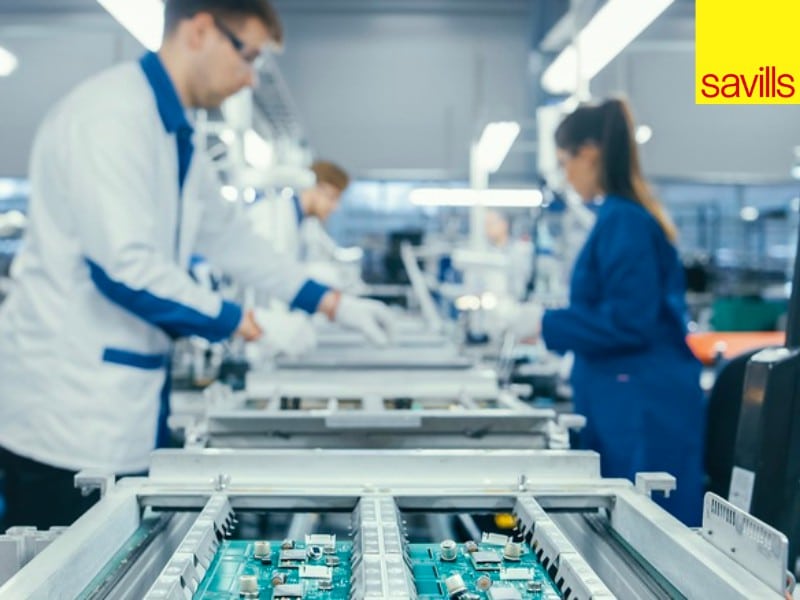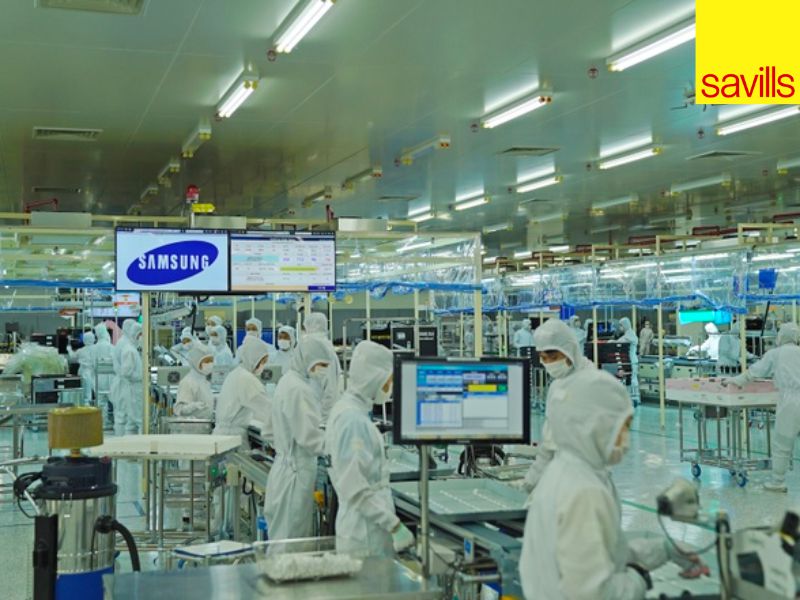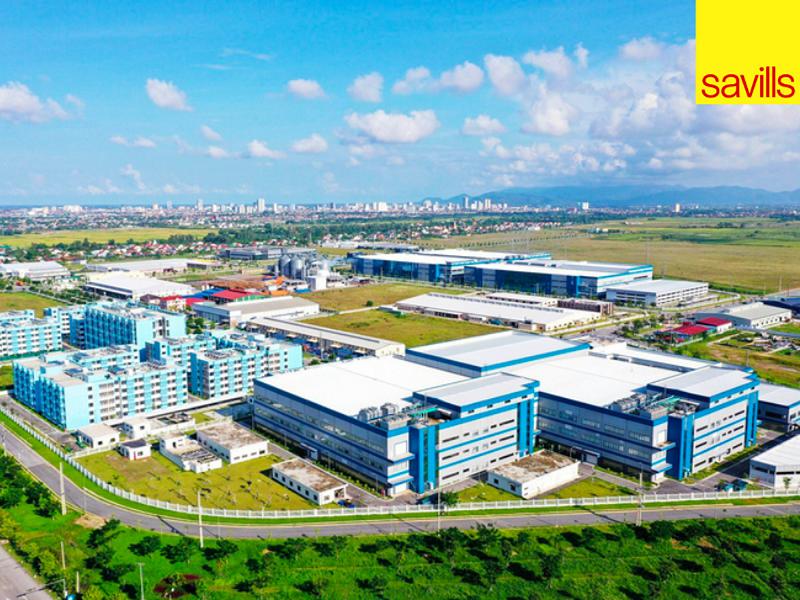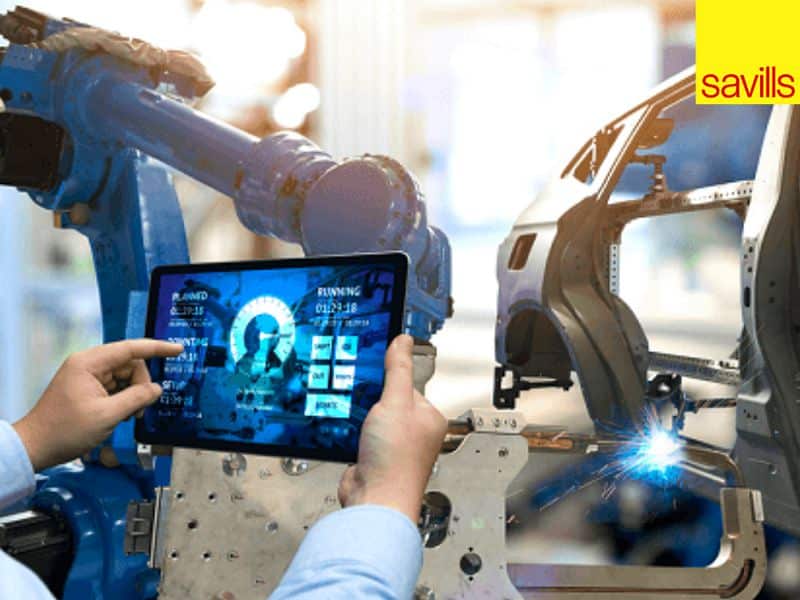
Smart factory in Ho Chi Minh City is an investment area of special interest to the city government and investors. When market trends are always changing, it requires the application of modern technology to research and meet increasing demands. However, this is also an area that requires businesses to face many challenges, but this is an optimal solution for production efficiency for factories in the new era.
Vietnamese smart factories, by applying artificial intelligence (AI) in production, will help enterprises analyze production data to optimize production processes, detect product defects, reduce waiting times, reduce manufacturing errors, and increase productivity.
At the same time, AI can analyze data and predict market demand; businesses rely on it to forecast product demand and optimize production plans to better meet market demand.
The AI system with all the digitized data is used for analysis to detect the problems businesses are facing and then offer appropriate solutions. Based on that, enterprises will optimize to increase the efficiency of factory management.
According to estimates by Accenture and Frontier Economics, by 2035, AI will increase labor productivity by 40% in 16 industries. The researchers also predict that AI can add $3.8 trillion in added value to manufacturing sectors.

Artificial intelligence applications help businesses adapt quickly to the market
Using the Internet of Things (IoT) to link devices will increase production efficiency. IoT allows devices to be connected to each other and to the factory management system via the internet. Enterprises can easily and directly monitor processes and equipment, helping to optimize the production process and reduce loss and production costs.
At the same time, through the process of connecting the machine system, it is possible to predict the impending incident and take measures to prevent and reduce risks. The automation of machines is connected via IoT, which enhances automation and reduces dependence on people, increasing production efficiency.
Smart factories in Ho Chi Minh are also equipped with a system of robots to perform repetitive tasks, such as assembling products or packing goods. The use of robots helps reduce human errors, increase productivity, and reduce labor costs, especially in jobs that require high labor costs or are dangerous to people.
Read more: Things of Note for the Need to Leasing a Medium-sized Factory in Southeast Asia
Smart factories bring businesses many important benefits, including:
– Increase productivity and reduce production costs: AI and IoT technologies help optimize production processes, reduce waiting times and production costs, help businesses improve productivity and efficiency, and increase efficiency competition in the market.
– Improved product quality: the smart factory helps to reduce errors and increase accuracy in the production process, ensuring consistent and standard product quality. This helps businesses maintain and improve product quality, helping to increase their competitiveness in the market.
– Save time and increase management efficiency: smart factories help automate production processes and reduce manual manipulation, optimizing production and operation processes.
– Increase safety and reduce risks for employees: the system of machines and lines operates automatically based on the settings of the linked network, increasing labor safety and increasing sustainability and transparency in the workplace. production activities; increase the trust of customers and partners.
– Increased flexibility to quickly respond to market needs: enterprises can customize production processes quickly to meet market needs, minimizing production process response times.

Smart factories help businesses optimize production processes, increase productivity, and be more competitive in the market
Read more: Cold Chain Logistics in Vietnam: Opportunities and Challenges
Vietnam is also a destination where businesses cooperate with the government to invest in smart factory projects. Some typical smart factory projects in the north of Vietnam are:
– Factory of Samsung Electronics Vietnam.
– Factory of LG Electronics Vietnam, in Trang Due Industrial Park, Hai Phong.
– The cooperation project of FPT Software and Julie Sandlau to deploy a smart jewelry factory in Vietnam will come into operation in 2023.

Samsung’s smart factory in Vietnam
Currently, a number of smart factory projects in the south of Vietnam have been deployed and put into operation, such as:
– Smart Factory project of Becamex IDC, in Binh Duong Industrial Park.
– Factory of Bosch Vietnam, in Long Thanh Industrial Park, Dong Nai.
– Adidas Shoes Factory – Kumho Vietnam, built in Long Hau Industrial Park, Can Giuoc, Long An.
– VNPT Robot Factory Project, deployed in Tan Thuan Industrial Park, District 7, HCM.
– CJ Cau Tre Food Factory, built in Nha Be Industrial Park, HCM.

Becamex IDC’s Smart Factory Project in Binh Duong Industrial Park
In the second half of 2022, HCMC. Ho Chi Minh City has also cooperated with Samsung to consult for many enterprises to develop smart factory models such as Kem Nghia, Dien Quang light bulbs, Liksin packaging, Lidovit, TCE Vietnam,…
Ho Chi Minh City’s Government proposed practical policies to attract more investment capital to develop smart factories in Ho Chi Minh. Firstly, improving the business environment by eliminating complicated administrative procedures. Second, invest heavily in technical infrastructure to ensure an adequate supply of electricity, water, and telecommunications services, as well as reduce the time it takes to transport goods. Third, invest in industrial innovation programs to promote the development of key industries such as automotive, textiles, electronics, mechanics, and food. Finally, building specialized training centers in artificial intelligence, IoT, and automation will help enterprises find highly qualified human resources to develop production.
Read more: 2023 Outlook for the Packaging Factory for Lease in Vietnam
To develop an effective smart factory in Ho Chi Minh City, it is necessary to invest in many areas, such as infrastructure, equipment, human resources, training, etc. However, some industrial zones have not been properly invested in and do not meet the requirements for infrastructure and equipment. With high costs, many small and medium enterprises have not really focused on this issue.
The development of a smart factory requires the application and integration of advanced technologies such as artificial intelligence, the Internet of Things, and robotics. However, the level of expertise and training in information technology and artificial intelligence is still limited. Therefore, enterprises need to consider proper investment and have appropriate technology development strategies to achieve high efficiency in smart factory development.

Smart factory in Ho Chi Minh brings many opportunities and challenges for enterprises
Despite facing many challenges, the application of smart technology, artificial intelligence, and IoT helps to optimize production processes, reduce production time, and improve product quality. Enterprises will reduce the amount of labor needed, and save production and management costs. Furthermore, reducing emissions and resource usage can help reduce production costs and create a better image for businesses.
Smart factory solutions allow businesses to meet the increasingly diverse and complex needs of the market. Create unique, high-quality products to increase competition and attract new customers. Investing in smart technology also helps businesses adapt to market changes and attract highly specialized labor resources.
Read more: Binh Duong Real Estate Vietnam: Growth, Development, and Investment Potential
More: Savills Viet Nam Brokers Factory Lease Between framas and KTG Industrial
Smart factory in Ho Chi Minh is a trend that the city government and businesses are particularly interested in in the industry 4.0. Using these factories helps businesses optimize their management systems, increase labor productivity, and create competition in the market. However, businesses also face many challenges to solve such as problems of technology, human resources, and infrastructure,…
Contact Savills Vietnam via hotline: 0986.718.337 – Mr John Campbell for detailed advice on industrial real estate. We offer solutions tailored to your needs and maximum support from our team of experts.
In addition, you can refer to Savills’ industrial real estate projects here.